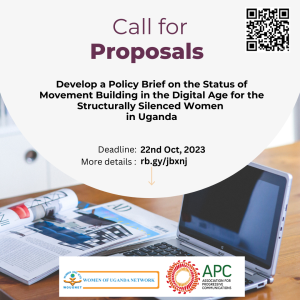“If the internet were a place, person, or object, what would it be?”
The answers were as profound as they were imaginative:
- “It would be a mother, because it provides information about anything.”
- “It would be this very venue, where diverse groups of people meet and connect.”
This simple yet powerful metaphor set the tone for two days of deep reflection, learning, and co-creation at the Strengthening Gender and Human Rights Engagement in the Internet Governance Forum (IGF) workshop, held at Keba Xpress Hotel, Entebbe, on 26th–27th June 2025.
The Our Voices, Our Futures (OVOF) project brought together over 27 participants from civil society, academia, media, government, and the legal fraternity to strengthen gender and human rights engagement in the Internet Governance Forum (IGF). For many, it was not just a workshop, it was a space of awakening, a call to action, and a reminder that internet governance is not a faraway global affair but a lived, urgent local reality.
The IGF is a critical space for inclusive dialogue on global internet policy issues. Yet, women human rights defenders (WHRDs), feminists, and grassroots voices often remain underrepresented. This workshop set out to address that gap by equipping participants with knowledge, skills, and strategies to meaningfully influence IGF processes.
Why This Matters
WOUGNET has championed women’s use of Information and Communication Technologies (ICTs) since 2000. Through the OVOF consortium, Uganda joins Bangladesh, India, Kenya, Lebanon, and Sudan in amplifying the voices of structurally silenced women and trans persons. The long-term goal is clear ensure that women actively and safely engage in online, legal, and public spaces to demand their rights and shape policy.
Inside the Workshop
Day 1: Building the Foundations
The first day opened with introductions from diverse participants representing organizations such as FIDA Uganda, Nile Girls Forum, Makerere University, Uganda Law Society, ISOC Uganda Chapter, Barefoot Law, and Uganda Broadcasting Corporation (UBC) among others.
Key sessions included:
- How the Internet Works: Esther Nyapendi, WOUGNET’s Technical Support Officer, broke down internet architecture and governance, using relatable analogies like comparing IP addresses to street addresses and routers to post offices.
- Introduction to IGF: Innocent Adriko from the ISOC Foundation led an interactive session on IGF’s history, structure, and purpose. Participants reflected on internet governance as both technical and political shaping how people access and use the internet.
- Group Work on IGF Policy Networks:
- Meaningful Access: Strategies to bridge Uganda’s rural digital divide through inclusive policies, affordable connectivity, and local innovations.
- Internet Fragmentation: Examining risks of government overreach, commercial practices, and unequal access.
- Artificial Intelligence (AI): Crafting national AI policies that emphasize transparency, ethics, and local capacity-building.
The day ended with reflections emphasizing multi-stakeholder collaboration and the urgent need for academia, government, and civil society to work hand-in-hand in shaping digital policy.
Day 2: Gender and Human Rights at the Center
The second day deepened the discussions by focusing on gender and human rights dimensions of internet governance.
- Internet Numbers & Names: Adriko explained ICANN and IANA’s role in coordinating IP addresses and domain names, encouraging participants to apply for global fellowships and free courses to enhance their technical expertise.
- Gender and Internet Governance: Sandra Aceng facilitated a powerful session linking internet governance with gender equality. She highlighted how policies can either reinforce or dismantle inequalities especially in AI, where biased datasets and male-dominated design exclude women’s voices.
- Feminist Principles of the Internet: Participants explored principles such as access, public participation, economic justice, and freedom of expression. These sparked conversations on how Uganda can localize feminist internet values to address gender gaps in policy-making and digital access.
- Group Work on Advocacy:
- Mapping Power in IGF Spaces revealed that women’s rights actors remain peripheral in global governance structures, with limited access to decision-making.
- Case Studies on Women’s Online Rights highlighted real-life experiences of cyber harassment, exclusion, and surveillance.
- Policy Recommendations on Surveillance & Privacy called for human-rights-based reforms, community-led governance, literacy campaigns, and alignment with African Union frameworks.
Key Takeaways
By the end of the workshop, participants identified several strategies and recommendations to advance Uganda’s role in global internet governance:
- Establishing a policy forum on gender and internet governance.
- Promoting digital literacy and skills, especially among women and youth.
- Ensuring inclusive participation in IGF processes, backed by funding and structural support.
- Strengthening data protection and privacy laws with human-rights-based safeguards.
- Contextualizing global frameworks like the Global Digital Compact (GDC) into Uganda’s national policies.
Above all, participants emphasized that empowering structurally silenced groups is not just about representation it is about real influence, safety, and dignity in digital spaces.
Looking Ahead
The workshop’s outcomes will feed into Uganda’s contribution to the global IGF and other regional policy dialogues. WOUGNET, alongside OVOF partners, will continue to amplify the voices of women and marginalized communities to ensure that internet governance is inclusive, equitable, and rights-based.
As one participant, Caroline Cherop, reflected:
“Multi-stakeholder collaborations must ensure that AI and other digital mechanisms uphold human standards.”
And as Sandra Aceng reminded us:
“Increasing women’s leadership in internet governance is not just about numbers it’s about ensuring meaningful participation and real change.”
With these commitments, Uganda is better positioned to contribute to a global digital future where all voices especially those historically silenced are heard, valued, and protected.
Complied by
Esther Nyapendi
Technical Support Officer (Project Lead-OVOF)





